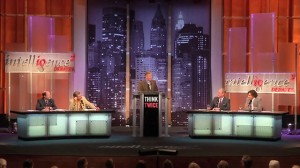In Citizens United v. FEC, the Supreme Court ruled that corporations, like people, are guaranteed free speech — and that includes the right to give millions of dollars to super PACs and other political organizations. Many Americans, including the president, have been critical of the 5-4 decision, but Citizens United does have it’s defenders, many of whom make their argument on First Amendment grounds.
The television and radio series Intelligence Squared recently sponsored a debate between two teams on opposite sides of the super PAC debate. Arguing in favor of increased super PAC regulation were former Federal Elections Commission chair and general counsel to John McCain’s 2000 and 2008 presidential campaigns Trevor Potter and hedge fund manager and Roosevelt Institute fellow Jonathan Soros, son of George Soros. Reason magazine editor Jacob Sullum and David Keating, the president of the conservative Center for Competitive Politics and founder of SpeechNow.org, argued for unfettered super PAC-involvement in elections.Sullum, a libertarian journalist, was the only panelist not affiliated with a super PAC, although Potter and Soros’s PACs have at least a hint of irony to their missions: Soros runs an anti-super-PAC super PAC called Friends of Democracy, and Potter helped Steven Colbert set up his satirical super PAC, Americans for a Better Tomorrow, Tomorrow.
The full debate clocked in at nearly two hours, so we’ve excerpted our favorite parts in video clips below.
Sullum and Keating, the two panelists arguing for unregulated super PACs, say the issue is about free speech. Super PACs, Keating claims, give ordinary citizens the ability to band together and have their voices heard.
Soros and Potter, the panelists in favor of increased regulation and disclosure, argue that super PACs would open the door to increased political corruption.
The debate ultimately revolve around two central questions:
(1) If campaign donations are a form of speech, when is stifling speech warranted to stop political corruption?
(2) To what extent should an individual’s wealth, or lack of it, dictate the volume of that individual’s free speech?
In his opening statement, Soros, who leads the anti-super-PAC super PAC, points out that donations from only about 200 people accounts for 80 percent of PAC money. This, he argues, is proof positive that super PACs do not amplify the voices of the disenfranchised. “I don’t think we can rely for political diversity on disagreements between rich people,” he said.
“Don’t knock disagreeing rich people,” replies Sullum the libertarian journalist. He makes the case that in the Republican primary, super PACs enabled Newt Gingrich and Rick Santorum to stay in the race longer — providing GOP voters more choice and forcing frontrunner Mitt Romney to clarify his positions.
Soros and Potter argue that throwing money into primetime advertising on behalf of a candidate essentially amounts to corporations buying votes from Americans and favor from that candidate — a practice that, if not technically “corruption,” looks a lot like it. Keating, who in 2010 sued the Federal Election Commission arguing that FEC limits on campaign contributions to PACs were unconstitutional, gets an unintentional laugh from the audience when he responds that “there’s really no evidence that votes can be bought.”
The Intelligence Squared debates are competitions: The audience is polled at the start of the debate and again at the end — whichever side converts more people to its way of thinking wins. At the beginning of the debate, 18 percent of the audience was undecided; by the end, only 9 percent. Both sides made converts, but the pro-regulation side gained more.
It’s an interesting debate, with more nuance than there’s space to discuss here. Head over to Intelligence Squared’s website to watch the full debate, read the transcript or download the debate audio as a podcast.


